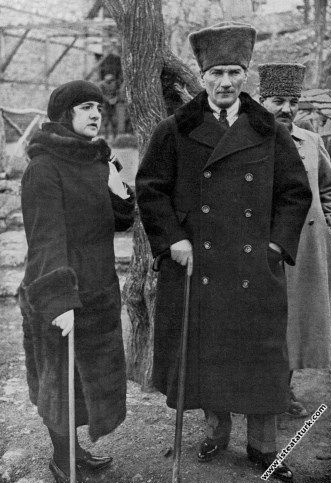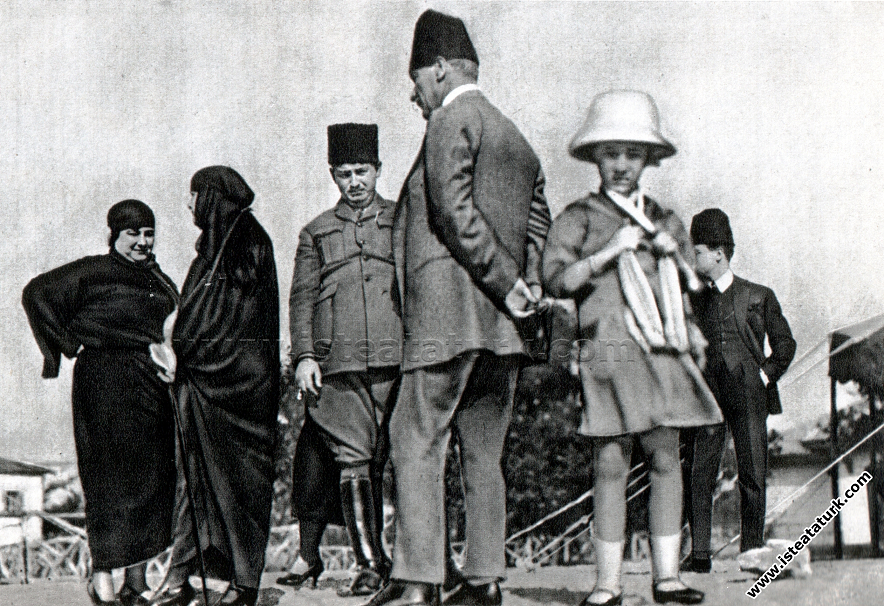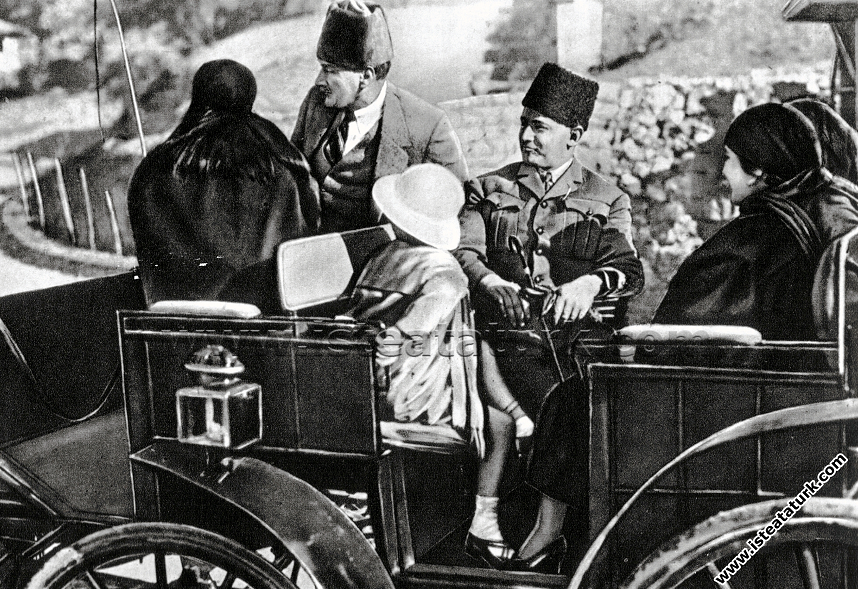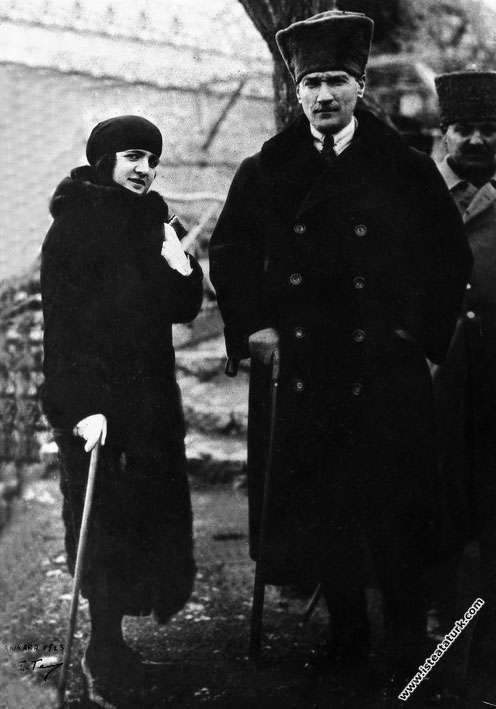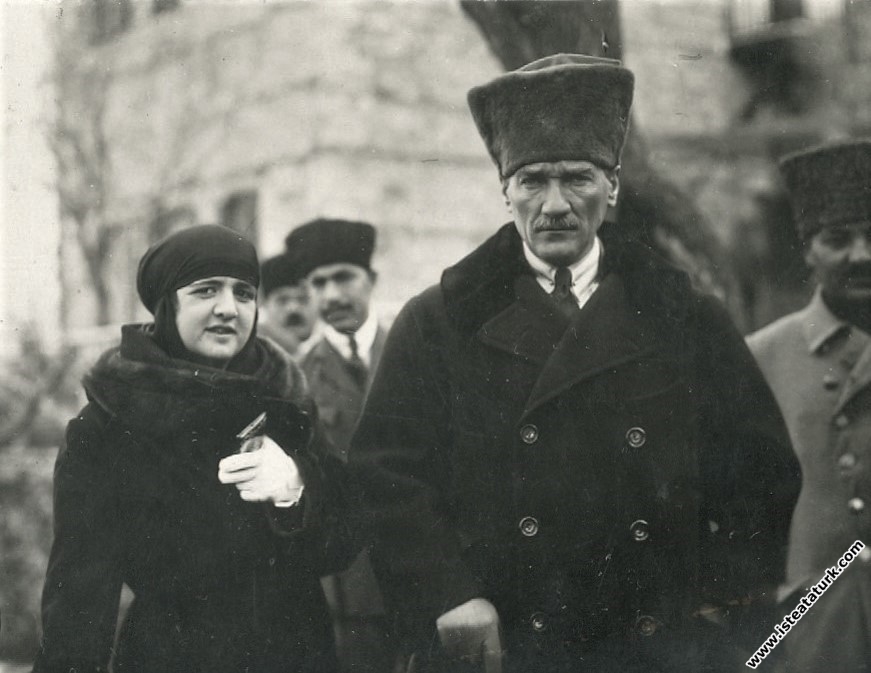Gazi Mustafa Kemal Pasha with his wife Latife Hanım in Ankara. (03.03.1923)
| Photographer: Etem Tem |
Photograph on the cover of The L'Illustration News, March 10, 1923. (March 3, 1923)
Photograph on the cover of The L'Illustration News, March 10, 1923. (March 3, 1923)
_2ss.jpg)
Issue of The L'Illustration News, March 10, 1923
This photograph is on the cover of the weekly magazine titled "The L'Illustration London News", which gives wide coverage to the reforms taking place in Turkey, especially to the developments in women's rights, "The symbol of freedom for Turkish women. Kemal's veiled wife'' was included with the phrase.
LATİFE HANIM TELLS FAMOUS JOURNALIST PRICE ABOUT HIS LIFE AND FEATURES
Journalist Ward Price came to Istanbul as a war correspondent at the end of the First World War, and made interviews with the outstanding figures of the time on behalf of the Daily Mail newspaper. Staying at the Pera Palas Hotel, Price also met Mustafa Kemal. Pasha saved Istanbul by stopping the Anzac Corps attack three times in a row at Çanakkale and pinning them to the shore, but also dealt a significant blow to the Allies by cutting the connection between the Russians and the Allies. Aspinal Oglander, who wrote the history of the Dardanelles battles about this extraordinary achievement, which has a great place in the history of the war, wrote the following about Mustafa Kemal in his book The Official History of the Gallipoli Campaign:
"... It is rare in history that a Division Commander, by his solo actions in three different places, has won a war, or even a victory of greatness that will change the fate of a nation" (p. 250-251)
But unfortunately, not a single line was reflected in the press about these extraordinary achievements of Mustafa Kemal. Because the Deputy Commander-in-Chief and Military Warfare Nazın Enver Pasha put a heavy censorship on all news about him in order to keep Mustafa Kemal, whom he considered a formidable opponent, away from the attention of the Palace and influential circles: It is strictly forbidden to have his name and picture in the press. Mustafa Kemal Pasha, who wanted to meet with Ward Price, who was in Pera Palace to interview Turkish politicians about the problems caused by the First World War, expressed his heart at length about these disasters in the country.
Ward Price wrote of this interview years later (1922):
“I came to Istanbul for the first time in 1918. They said that a Turkish general wanted to meet with me. I asked his name and they said Mustafa Kemal. At that time, I had heard the name Mustafa Kemal vaguely. I gladly accepted the invitation.
“Mustafa Kemal was thoughtful and pessimistic. He told me about the state of your country. In every two sentences, he was saying: “This cannot be done like this- The homeland must be changed completely, it is necessary to renew it”. At the time, I didn't really pay much attention to these words. The biggest mistake of my profession that I will always remember is that I did not discover this unique genius at that time.” (Cumhuriyet newspaper, 70 December 1939).
Ward Price, who missed the most important opportunity of his life, ran straight to İzmir after Zafer and had the honor of interviewing Mustafa Kemal (Interview date, September 12, 1922).
Ward Price is always after Atatürk. Atatürk married Latife Hanım on 29 January 1923 in İzmir. For Price, this is an unmissable journalistic event. Now he is always behind Mustafa Kemal and is trying to make an interview appointment.
Atatürk returned to Ankara with Latife Hanım on 20 February 1923. Price circles around Atatürk in order to get permission for an interview with Latife Hanım. This fierce and caring journalist finally gets his wish. He manages to get an appointment for the 26th day of 1923.
This interview of Price was published in the issue of Tevhidiefkar newspaper dated March 6, 1923. Here's the interview, but with simplification:
“Mister Ward Price, the Ankara correspondent of the Daily Mail newspaper, talks about a tea feast in Mustafa Kemal Pasha's Mansion in the article he sent to the newspaper as follows:
“Mustafa Kemal Pasha's young wife is a remarkable person who will become the First Lady in her hometown. Turkey's military President added another success to his successful life by choosing Latife Hanım, the daughter of Uşakizade Muammer Bey, one of the main merchants of İzmir. If His Excellency had called Turkey, he would not have found a more worthy woman than Latife Hanım to be the life partner of the Head of the Government of Turkey (who will become the 'state').
Latife Hanım told me that she lived in France for a few years and in London for a year. In addition, Latife Hanım speaks English and French as her mother tongue, as she was brought up by an English governess.
Latife Hanım’la Mustafa Kemal Paşa’yı birleştiren, harbin garip tesadüflerinden biridir. Bu tesadüfün nasıl olduğunu Latife Hanım bugün bana Türk Milleti tarafından Paşa’ya hediye olunan Köşk’te verilen çay ziyafeti esnasında anlattı. Köşk bir dağın kenarında bir bahçenin içinde ve Ankara’dan 5 mil mesafede bulunmaktadır. Mustafa Kemal Paşa genç eşini buraya getirmiştir.
In the autumn of 1921, Latife Hanım returned to Izmir from Europe. Izmir was in the hands of the Greeks at that time. The Greeks had arrested Latife Hanım's father and arrested Latife Hanım for espionage. Latife Hanım was sentenced to live in her own house and two Greek guards were stationed at her door. Latife Hanım spent three months in this way in an annoying non-stop. One morning in September last year, Greek soldiers suddenly dropped their weapons and disappeared. Turks were coming.
Latife says:
—"A few days later, when Mustafa Kemal Pasha was victorious in Izmir, I invited him to reside in our house. I had never seen Pasha before. We had suffered a lot under the Greek administration and suffered many casualties. The whole nation was very grateful to Pasha. We were indebted to them. To express our debt of gratitude, they were humbled to accept my invitation and gave me the honor of hosting them. When I met with him, I realized that we share the same view about the problems of the country. When we got to know each other better, we believed in the fact that our ideal friendship would continue as a togetherness, so one day we asked about fifty sixty friends to come to us for a tea party.We also called the mufti but did not explain that it was about a marriage.
After the guests arrived, we got married (with a surprise) in my father's guest room in a simple and informal ceremony."
Mustafa Kemal Pasha's wife is alive like a French woman. But his pale white face with expressive dark eyes is completely Turkish. Like most of her compatriots, Latife Hanım's face is small but collected. She wore a simple black dress nationally. Her hair, which was the color of black chestnut, was covered with a black veil.
While drinking tea, Ismet Pasha came; He had brought the ring that Mustafa Kemal Pasha had ordered to Switzerland. The ring is a thin small platinum ring with the inscription "Mustafa Kemal" in Turkish.
In addition to Mustafa Kemal Pasha, İsmet Pasha and me, Rauf Bey, the Head of the Delegation, also came, Rauf Bey, who had studied in England, also spoke good English.
Before Latife Hanım's European tea feast, we had coffee with Mustafa Kemal Pasha and ate jam in silver plates. For this reason, Mustafa Kemal Pasha left the table where he worked with Rauf Bey and a few clerks. The room was filled with many valuables and oriental goods. All of these were gifts sent to Mustafa Kemal Pasha from various parts of the Islamic world. Swords of gold and silver gleamed on the rare antique carpets that hung on the walls. One of these fine swords was hanging behind the sofa where Latife Hanım was sitting. There was also a plate covering a surah from the Quran.
I asked Mustafa Kemal Pasha if he was worried about the reaction and opposition of the Turkish society to save Turkish women, to remove their veils and to involve them in politics. Mustafa Kemal Pasha said:
—"If you think that Turkish women have withdrawn into a corner in social life and have entered their shell, you have misunderstood them. Eighty percent of our people are peasants. Among them, women work side by side with men and participate fully in the life of men. The rest of the people live in towns, in big cities such as Izmir or Istanbul. The fact that women live apart from men in these places is because of the selfishness of men, which is a bad custom. Almost all women are against this. All Turkish women are waiting for the day when they will be in full equality and partnership with men.
Latife Hanım intends to join her in all official travels of her husband...”
Sadi Borak
Source: ATATÜRK ARAŞTIRMA MERKEZİ DERGİSİ, Sayı 16, Cilt VI, Kasım 1989
